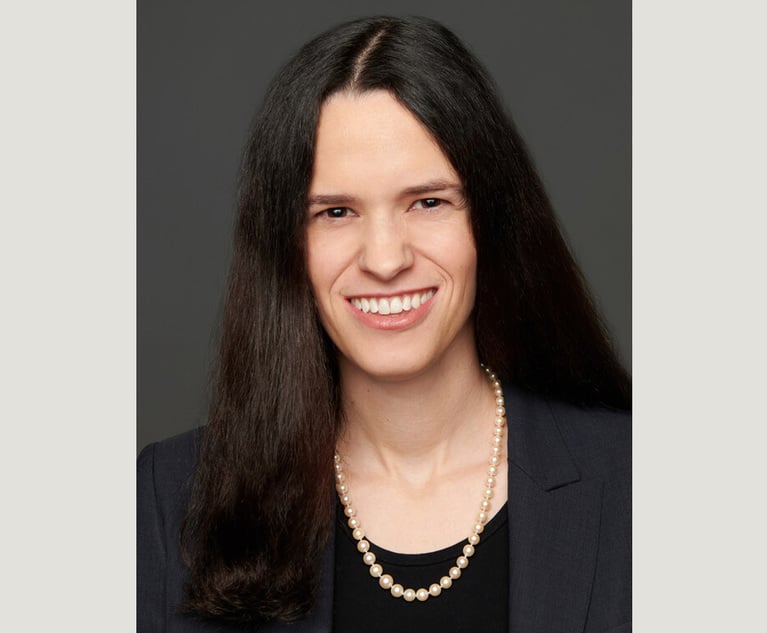SCOTUS Passes on Facebook Fight Over Criminal Defendants' Social Media Access
The U.S. Supreme Court denied a petition for certiorari in a case exploring the constitutionality of a platform's refusal to turn over user communications that could help alleged criminals build their defense.
May 18, 2020 at 05:38 PM
4 minute read

The U.S. Supreme Court has refused to take on a Facebook case that could have set new standards for alleged criminals' access to social media in their defense.
Although prosecutors can dig up evidence from social media to make their cases, companies such as Facebook have quashed criminal defendants' subpoenas under the Stored Communications Act, a move that some defendants have said violates their constitutional rights.
On Monday, the Supreme Court denied certiorari in Facebook v. Superior Court of California. The case questioned whether Facebook's refusal to hand over users' communications violated the Sixth Amendment and due process rights of two men indicted on murder, weapons and gang-related charges.
Gibson, Dunn & Crutcher represented Facebook in its petition for writ of certiorari filed in February. The lawyers challenged a July 2019 order from San Francisco Superior Court Judge Charles Crompton, which held Facebook and Twitter in contempt for refusing to disclose account holders' electronic communications in response to subpoenas from criminal defendants Derrick Hunter and Lee Sullivan.
"The California court's decision erodes the trust in the privacy of electronic communications instilled by the SCA. It prioritizes a criminal defendant's desire to obtain communications from whatever source she prefers—often without the knowledge of the people whose communications are at issue—despite the wishes of social media users who sent the messages and have not consented to sharing them," wrote the Gibson, Dunn & Crutcher attorneys in the petition.
Gibson Dunn's Joshua Lipshutz declined to comment on the case, and Facebook did not respond to a request for comment.
In February, California's First District Court of Appeal directed the trial court to quash the subpoenas, finding that the defendants did not show the requisite finding of good cause for production of the private communications. An order has yet to be handed down to the superior court because Sullivan's counsel at the Law Office of Bicka Barlow and San Francisco attorney Susan Kaplan petitioned the California Supreme Court to review the decision.
In denying Facebook and Twitter's motion to quash the subpoenas, Crompton said Hunter and Sullivan's Sixth Amendment and due process rights were "very important." The judge said, "I think that these rights are important enough in this particular case, as I've said, given the relevance of electronic messages that's been raised in this particular case, with these particular charges and these particular defendants, it would certainly outweigh any … burden [incurred by providers]," according to the Court of Appeal ruling.
Hunter and Sullivan issued the subpoenas in 2014 for the Facebook, Instagram and Twitter accounts of Jaquan Rice Jr., who was killed in a shooting, and state's witness Renesha Lee. Rice allegedly threatened to kill Hunter's 14-year-old brother over a reported gang dispute in person and on Facebook and Instagram, according to the Court of Appeal opinion.
As the case bounced around California's court system, the criminal trial against Hunter and Sullivan moved forward without the subpoenaed information. Sullivan was convicted on all counts, and Hunter was acquitted.
In an April reply brief, Bicka Barlow of the Law Office of Bicka Barlow and Stuart Banner of the University of California, Los Angeles School of Law Supreme Court Clinic urged the court to deny cert. They said the case is a "a terrible vehicle" to address the issue, because the case is moot, has a "bizarre procedural posture" and does not highlight a lower court split, as Facebook alleged in its petition. "If this supposed conflict had ever existed, it would exist no longer, now that the Superior Court's judgment has been vacated by the Court of Appeal," they wrote. "But it never even existed in the first place. In each of the three cases cited by petitioners, the court explicitly avoided reaching the constitutional issues."
A spokesperson for Twitter said that the company will continue to fight to preserve this protection for its users.
"We took a stand against the state court's order in this case because we believe it violates the federal Stored Communications Act and undermines a key purpose of that law—to protect individuals' privacy rights in electronic communications," the spokesperson said.
This content has been archived. It is available through our partners, LexisNexis® and Bloomberg Law.
To view this content, please continue to their sites.
Not a Lexis Subscriber?
Subscribe Now
Not a Bloomberg Law Subscriber?
Subscribe Now
NOT FOR REPRINT
© 2025 ALM Global, LLC, All Rights Reserved. Request academic re-use from www.copyright.com. All other uses, submit a request to [email protected]. For more information visit Asset & Logo Licensing.
You Might Like
View All
In-House Moves of the Month: Boeing Loses Another Lawyer, HubSpot Legal Chief Out After 2 Years
5 minute read
Mike Lynch's Brush With Prison Taught Him Life Is Precious. Then a Yacht Accident Proved Him Right

Facing a Shrinking Talent Pool, Insurance Defense Firms Are Fighting to Add Attorneys
6 minute read
AG Garland Calls Prosecuting Execs 'Greatest Deterrent' to Corporate Fraud
Law Firms Mentioned
Trending Stories
- 1'I Can't Do This': Judge Blocks $16M Alex Jones Settlement
- 2TikTok Opts Not to Take Section 230 Immunity Fight to U.S. Supreme Court
- 3Feasting, Pledging, and Wagering, Philly Attorneys Prepare for Super Bowl
- 4Special Section: 2025 Real Estate Trends
- 5Snap Paid $63M in Fees to 2 Am Law 200 Firms in '24
Who Got The Work
J. Brugh Lower of Gibbons has entered an appearance for industrial equipment supplier Devco Corporation in a pending trademark infringement lawsuit. The suit, accusing the defendant of selling knock-off Graco products, was filed Dec. 18 in New Jersey District Court by Rivkin Radler on behalf of Graco Inc. and Graco Minnesota. The case, assigned to U.S. District Judge Zahid N. Quraishi, is 3:24-cv-11294, Graco Inc. et al v. Devco Corporation.
Who Got The Work
Rebecca Maller-Stein and Kent A. Yalowitz of Arnold & Porter Kaye Scholer have entered their appearances for Hanaco Venture Capital and its executives, Lior Prosor and David Frankel, in a pending securities lawsuit. The action, filed on Dec. 24 in New York Southern District Court by Zell, Aron & Co. on behalf of Goldeneye Advisors, accuses the defendants of negligently and fraudulently managing the plaintiff's $1 million investment. The case, assigned to U.S. District Judge Vernon S. Broderick, is 1:24-cv-09918, Goldeneye Advisors, LLC v. Hanaco Venture Capital, Ltd. et al.
Who Got The Work
Attorneys from A&O Shearman has stepped in as defense counsel for Toronto-Dominion Bank and other defendants in a pending securities class action. The suit, filed Dec. 11 in New York Southern District Court by Bleichmar Fonti & Auld, accuses the defendants of concealing the bank's 'pervasive' deficiencies in regards to its compliance with the Bank Secrecy Act and the quality of its anti-money laundering controls. The case, assigned to U.S. District Judge Arun Subramanian, is 1:24-cv-09445, Gonzalez v. The Toronto-Dominion Bank et al.
Who Got The Work
Crown Castle International, a Pennsylvania company providing shared communications infrastructure, has turned to Luke D. Wolf of Gordon Rees Scully Mansukhani to fend off a pending breach-of-contract lawsuit. The court action, filed Nov. 25 in Michigan Eastern District Court by Hooper Hathaway PC on behalf of The Town Residences LLC, accuses Crown Castle of failing to transfer approximately $30,000 in utility payments from T-Mobile in breach of a roof-top lease and assignment agreement. The case, assigned to U.S. District Judge Susan K. Declercq, is 2:24-cv-13131, The Town Residences LLC v. T-Mobile US, Inc. et al.
Who Got The Work
Wilfred P. Coronato and Daniel M. Schwartz of McCarter & English have stepped in as defense counsel to Electrolux Home Products Inc. in a pending product liability lawsuit. The court action, filed Nov. 26 in New York Eastern District Court by Poulos Lopiccolo PC and Nagel Rice LLP on behalf of David Stern, alleges that the defendant's refrigerators’ drawers and shelving repeatedly break and fall apart within months after purchase. The case, assigned to U.S. District Judge Joan M. Azrack, is 2:24-cv-08204, Stern v. Electrolux Home Products, Inc.
Featured Firms
Law Offices of Gary Martin Hays & Associates, P.C.
(470) 294-1674
Law Offices of Mark E. Salomone
(857) 444-6468
Smith & Hassler
(713) 739-1250






